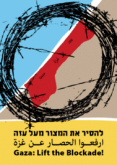NGO Gaza Campaign as Prelude to the 2009 Durban Review Conference


Two distinct groups of NGOs have emerged in recent weeks, with some participating in the campaign of false accusations and double standards against Israel’s responses to Hamas attacks from Gaza, while another group denounced the anti-Semitism of the Durban NGO Forum. The first group includes Amnesty International, Oxfam, World Vision, Human Rights Watch, Christian Aid, FIDH (France), Defence for Children International, as well as other groups (many funded by the European Union and the New Israel Fund) including Adalah, B’Tselem, Gisha, Ha-Moked, PCHR, Al-Haq, Al-Mezan, and BADIL. In their statements, press releases, and submissions to the discredited United Nations Human Rights Council [1], these NGOs aggressively promote the 2001 Durban strategy of demonization, using the politicized rhetoric of human rights, such as “collective punishment” and "crimes against humanity," while ignoring the war crimes and aggression of Hamas. A January 26, 2008 protest event organized and attended by members of ICAHD (funded by the EU) and Adalah (funded by the EU and New Israel Fund), the Alternative Information Centre (AIC), and other groups (with publicity by the American Friends Services Committee) took place near Gaza’s Erez crossing, under the slogan ‘Gaza: Lift the Blockade!’ Speakers from these groups demanded Israel open Gaza border crossings, and condemned the closures as "collective punishment". (For detailed analysis, see NGO Monitor’s January 2008 report: Analyzing the NGO Campaign on Gaza – Beyond the Rhetoric).
In contrast, a smaller group of NGOs led by Magenta (based in Holland), in cooperation with the Jacob Blaustein Institute for the Advancement of Human Rights, published a "Statement of Core Principles for WCAR [UN World Conference against Racism] Follow up". In condemning the 2001 Durban NGO Forum, the signatories pledged to “reject hatred and incitement in all its forms, including antisemitism, to learn from the shortcomings of the 2001 WCAR, and to work together in a spirit of mutual respect. The statement also highlights the "violations of procedure in the preparatory and drafting processes, … racist treatment including violence, exclusion and intimidation against Jewish participants, and the misuse of human rights terminology in the document related to the Israeli- Palestinian conflict."
Signatories include Rabbis for Human Rights (RHR), Human Rights First, and UN Watch, as well as a number of Jewish NGOs. (See the January 13 Jerusalem Post editorial — "Averting another Durban".) This statement, which controversially praised Mary Robinson’s very belated protest in the 2001 Conference, will have an impact if signed by many more NGOs, and contributing to a coalition influential enough to prevent abuse in tthe NGO Forum of the 2009 Review Conference, if this takes place.
In addition, on January 23, the Canadian government announced that it will not participate in Durban II and takes a "firm stance" against the conference. In making the decision, Canada’s Minister of Foreign Affairs remarked that Durban I “’degenerated into open and divisive expressions of intolerance and anti-Semitism that undermined the principles of the United Nations and the very goals the conference sought to achieve” and concluded that despite Canadian efforts, the preparatory process for Durban II would not “remedy the mistakes of the past.’” The policy decision was endorsed by the two main Canadian opposition parties – the Liberals and NDP. (See also "Gearing up for another Durban", Anna Morgan, The Toronto Star, January 20, 2008; "Shun Durban II", Marni Soupcoff, The National Post (Canada), January 25, 2008; "What’s at stake at Durban II", David Frum, National Post, January 26, 2008).
—
[1] Al Haq and Defence for Children International submitted a written statement to the Council.
